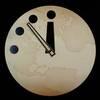Sign In
CloseLong, rambling post about politics, abstraction, complexity, and the nature of objective reality by MLR
As I'm sure everyone everywhere with access to media of any kind is aware, we've got an election coming up here in the US on Tuesday. I think it's been going on for around 68 years now. I haven't really been keeping track, but that number feels about correct.
It's been a trying campaign, for sure, on a number of levels and a lot of different ways. I've been thinking lately about one particularly vexing philosophical issue it seems to bring up, which is (at the risk of sounding lofty): the nature of truth. It's come up a lot given one candidate's penchant for unabashedly making shit up wholecloth at campaign rallies. This, at least, is a fact: you can find videos of the man saying one thing, and then a video taken at a later date saying the exact opposite and denying he ever said the first thing. That is called "lying".
But is it a fact? A big part of this man's campaign has been about conspiracy, as well. So here's a conspiracy theory: he doesn't ever contradict himself, and what we all remember him saying the first time is incorrect, and the video evidence is false because it's been doctored. If you have faith in this candidate, you will find yourself believing such a theory, and you will focus on the plausible elements of it to justify that belief to yourself. He's already convinced you that the mainstream media is biased against him (which seems to be true, as a whole) and that they therefore are constantly lying to you about him (not necessarily true, but it logically follows from the first that it could be true). As to all our collective memories, well, are you sure you remember him saying that? All the people who claim they remember that are liberals, and they remember it that way because it's convenient for them. So already you see some level of conspiracy, hence it doesn't that great of a leap to get to that next level.
So let's take one thing as an assumption: that objective reality does exist, and that it's unique. I think most people do agree on that. What then? How do you find it?
It's a dumb question because we all already know the answer. But I wonder if our worlds have just become so complicated and nuanced that most of us have lost track of where all of our truths actually came from, and therefore whether or not they're true at all.
Let me relate a personal story. And be forewarned: I'm going to delve into some moderately esoteric astronomy crap for this, but you'll see my point at the end (at least with regard to the nature of truth).
So the current project I'm working on for my thesis involved taking and analyzing what's called 'narrow-band imaging'. It's called that because we're limiting the light that comes into our telescope to a narrow range of wavelengths (just a few little slivers in the red part of the rainbow). We're trying to isolate one particular wavelength -- 656.3 nanometers -- which through a complicated series of arguments turns out to be a good tracer of ongoing star formation. If you observe a galaxy with a narrow-band filter centered on that wavelength, you get both the emission at that wavelength (which is what you want) AND all of the underlying starlight in the galaxy within your bandpass (which you don't want). So the solution is to then observe the same galaxy again to the same depth, but with a different filter that ONLY targets the underlying starlight. Then you subtract the image of the galaxy that targets only starlight from the one that targets starlight + your target wavelength. Wavelength + starlight - starlight = wavelength.
Now, the resulting 'difference image' that I took (the image that shows only the wavelength) has all these little points of light all over the frame. I didn't know what they were, so I set out to find out. Here's where I get back to the nature of truth.
I found a paper discussing what they called "H-alpha dots" (656.3 nanometers is called "H-alpha"). This was a pretty in-depth study, so they set out to find out exactly what these things were by using the gold-standard of astronomy: spectroscopy. This is where you use a device that splits the incoming light into its component wavelengths; you can see how this works by putting a sunbeam through a prism and looking at the rainbow that gets projected onto the wall. This is a remarkably important method because it turns out that each element on the periodic table has its own "light fingerprint" -- different forms of those elements will block or emit light at very specific wavelengths, so by looking at the gaps or bright lines in a star's spectrum, you can figure out what elements compose that star. We know this works because we've done laboratory tests as simple as heating up a gas until it glows and finding out where the bright line appears in the spectrum for each gas. Then later on, quantum mechanics gave it a fully self-consistent theoretical backing. We see it happen, and we have an explanation of why it happens that both holds up under scrutiny AND made predictions that were later confirmed. (We're talking about truth, here.)
Anyway, through spectroscopy, these authors found out what these H-alpha dots were, and they got a surface density of the dots (how many dots there are per square degree on the sky). So cool, maybe my dots are the same thing. But the problem was, I was seeing WAY more dots per square degree than they did (about a factor of 100 more), so maybe not. So why was that? Did I have better quality data and could see fainter dots, which would bump up the number? Or was it something else?
One thing these authors mentioned was that red dwarf and red giant stars occasionally showed up as dots, because of the way their filters were set up. Here's a picture of a red dwarf star spectrum: http://spiff.rit.edu/classes/phys301/lectures/blackbody/spec_m0v.gif
See all those peaks and troughs? They would show up in their difference images because one of their filters (that which contained the line+stellar continuum) would cover a peak and the other (that which covered only the stellar continuum) would cover a trough. Peak - trough = a bright spot. Now look at the x-axis of that spectrum: note that there's a peak right around 653.3 nm, and a trough right adjacent to it. So I looked at the wavelengths covered by our two filters, and found out that yes, our on-band filter (covering line + continuum) covered that peak and our off-band (just continuum) covered that trough right by it. Boom: I had a candidate.
So here's what I did: I used a program that automatically gets coordinates for all the points of light in an image (easy to check if it's working by plotting all the coordinates it pumps out onto the image itself and seeing if shit lines up), and then I went to a database called the Sloan Digital Sky Survey to get some properties of all those points of light. This is a database built over many years, by observing one piece of sky at a time using a whole bunch of different filters, as well as using spectroscopy, so it contains brightnesses, colors, and spectra of just about every point of light in the northern sky (and a lot in the southern). Totally different telescope, taken by other people for other purposes, but I had a stupidly simple idea in mind: red dwarf and red giant stars should be RED in color.
So I downloaded all the data for all the suspected red stars in my image and plotted up the colors of the stars. Guess what? All but a handful clustered around a very tight region in the color-color diagram -- the corner of the plot that was RED.
That's cool, right? I used a database that someone else had made for a completely different purpose to confirm something I suspected about data that I personally had taken using a different telescope altogether. Here's something even cooler: those handful of points that weren't red? Sloan had data on those, too, in the form of spectra. Turns out they were quasars (super bright and super distant galaxies), and that both quasars were emitting strongly in some Calcium lines that just happened to land right smack in the middle of my on-band filter, with no lines landing in my off-band filter.
So why was I finding way more H-alpha dots than this other team? Well, it's because of two things; they observed using a multitude of different filters (to target different redshifts... which I won't get into here), and the one filter they had that would pick up red stars in our Galaxy covered a narrower range of wavelength than ours. So they picked up fewer red stars in the one filter they had that would detect them, and all of their other observations were done with filters that wouldn't pick them up. Hence, fewer detections per square degree over their whole dataset.
Idea confirmed.
Now, I know what you're thinking. All in all, that was a pretty mundane task; I just wanted to know what a particular source of contamination was in my image. But when I solved that mystery it made me feel really excited, because I realized that it was the culmination of a whole lot of completely independent lines of thought and inquiry that all pointed to exactly ONE solution. Narrow-band imaging and spectroscopy that relies on how stars emit light, which relies on everything from how we think gravity works to how we think gases act under pressure to how individual atoms behave when they interact with each other to the nature of light itself. It was like seeing that all of these muddy and unsubstantial theoretical ideas I've been steeped in for the past 10 years all came together, and I realized that yes, those are STARS I'm looking at out there (despite just looking like smudgy collections of bright pixels on an image), and they really do look like everyone's been telling me they should. I am collecting photons emitted by real things in the universe.
But you see how long this post already is? How much I felt the need to mention to get you guys even a basic understanding of not only what I was doing, but what the problem was in the first place that I was trying to solve? And also how much I skimmed over and left out? You guys don't feel that same magic I felt, and there's no reason you should.
This is the world we live in now. I'm typing this on a computer. I don't really know how a computer works. I know it relies on something called transistors, and it relies on the flow of charged particles, logic gates, magnetism, and so on and so forth, but I couldn't explain the gestalt to you. It also has an LCD screen, which I know stands for liquid crystal display, but couldn't tell you much beyond that. I don't know how my car works, how my phone works, I don't know the plumbing system in my apartment, how the electric grid is set up, what the sewer system looks like in my city, who does the maintenance on the roads or the power lines, where I get my fresh water from, how the budgets are set up to pay for all this stuff using the taxes I pay, who even collects the taxes I pay and where all that information is held, and so on and so forth. And there isn't enough time in my entire lifespan to figure it all out, so in the end I just have to take a whole lot of stuff on faith. I am not alone in this.
So let's bring this back to politics, then. If you listen to the skeptic community (as I used to, before I got tired of their overly-arrogant attitude), you'll hear that all the world needs is for everyone to learn critical thinking. If everyone would just think critically, everything would be all right. But they leave out something really (dare I say, critically?) important from that argument: that in order for critical thinking to be effective, you have to do it in such a way that you uncover the objective reality. And then you have to be able to recognize that the reality you've uncovered actually is the objective one.
It's that last part that trips everyone up, I think. It's actually relatively easy to find objective reality in hard sciences like physics, because the laws are concrete and testable, and the tests can be repeated by independent teams (or teams actively working against each other!) and checked against each other. If I drop a rock, it falls toward the ground. If you do it, the same thing will happen. In fact, everyone who's ever done it sees the rock fall toward the ground. Gravity is part of objective reality, because it doesn't change from subjective experience to subjective experience. Our understanding of gravity is so goddamned good by now that we've managed to send a tiny little spacecraft on a decade-long journey involving multiple passages around multiple planets to lock into an orbit around a comet that's barely 2 miles across. That's like shooting a bullet from an apartment in Beijing, China, and hitting the north side of a specific grain of dust in a specific cornfield in Kansas.
Astronomy is actually a lot muddier because it's an observational science. What you see is all you get. Some claim that astronomy is what gave birth to statistics as a discipline, because you cannot repeat experiments in astronomy. You count up photons and you make inferences, and your inferences are only as good as your data. A single supernova only goes off once. You can't rewind the clock and watch it go off from a different angle; all you can do is wait for another one to go off and hope it's the same as the first. You do that enough times, you build up a statistical database of supernova and you make inferences based on that. There's a LOT of room for argument in astronomy. Things like economics, political science, sociology -- these are even worse.
So now we get to Joe Schmoe the voter, and they live in this world where people are constantly throwing data at them. They don't know where the data comes from, how it was analyzed, what kind of assumptions went into the analysis, or anything like that, and they don't have the resources or the time to figure it all out. I've now got a big ol' wrench that I can chuck at this system of Joe Schmoes that will jam everything up almost instantly, right? And that wrench is called "misinformation".
I'm on the campaign trail, and I tell a lie. It's a convenient lie; Joe Schmoe likes it because it conforms to their beliefs about the world, so they're predisposed to believe it. In comes a whole bunch of fact-checkers, though, who try to tell Joe Schmoe that what I said was actually a lie. So I just tell Joe Schmoe not to believe the so-called fact-checkers, and then I get a bunch of my people to start spreading my lie as truth, so that lots of Joe Schmoes start spreading that lie even farther. Now Joe Schmoe is in a pickle, because one camp is saying that my lie is a lie, and the other camp is saying that it's not a lie, and they don't have the time or the resources to figure out which one is right. All they have to really go by is their gut. And Joe Schmoe likes my lie because it conforms to their beliefs.
I win Joe Schmoe's vote.
In fact, not only do I win that vote, but I've just discovered the ultimate political weapon in our modern-day, way-too-complicated-to-understand world. It's a bomb so powerful that up until now, no politician has dared touch it. But that is now where our election has taken us. No more standards of decency, no more honor. The gloves are off.
What's my point, then? What's the moral, here?
Well, I don't have one. Just like everyone else, all I have to go on is personal experience and my own worldview. Mine was shaped by the course of study I chose. I do believe in an objective reality, and I've seen how it can be found through rigorous testing, but I also understand just how tall this pile I'm sitting on has become. The only way to truly convince anyone else of my ideas about astronomy is to take them through the same course of study I went through to get them on a common ground and then argue with them from that vantage-point. This is why academic communities become cloisters, but then that leads to mistrust of the cloisters from the people outside. And I don't know how to fix that. Used to be everyone just argued from, say, the Bible. Things made a lot more sense back then.
I actually tend to trust established politicians a lot more than I probably should, simply because I know there's a lot that goes on behind the scenes that I'm not privy to. Amusingly enough, I got to appreciate Hillary Clinton a lot more after I read some of her leaked e-mails. I haven't been a fan of hers. I voted for Bernie out of protest, and I kicked around voting for Jill Stein (until I listened to some of the words coming out of her mouth). But my opinion started to change after reading those e-mails. You know, the ones that were supposed to contain all of her devious plotting and compromising statements that prove just how cruel and evil she really is? I read them and started to understand where she's coming from, and that where she's coming from is frequently, quite simply, an excruciatingly practical place. She has ideas and she knows how to implement them using the system as it exists. Occasionally she flirts with the law, but she always stays inside of it. I guess you could call her sly. And if she's sly and has a progressive agenda, I'm okay with that. I would prefer someone a smidge less cynical, because I'm sure her constant suspicion of everyone around her is going to have some negative consequences (it already has), but when compared to everyone else who's running she's the one I would trust the most as president. She strikes me as a jaded Obama, I guess, and personally I think Obama has done pretty decent job, all things considered. You know. George H. W. Bush also did a decent job, all things considered. His presidency wasn't a downright disaster like his son's.
But that's me. I connect with people who understand how to deal with complicated situations, and I'd rather have someone who's competent in such matters sitting in the White House. I see Trump and I see a man who would bask for a couple of weeks in the glory of the Presidency, but would then get bored or tired and just shut down, start making lazy decisions without regard for consequences, and, worst case scenario, would start trying to make the job easier for himself by pushing the government more toward fascism. I mean, shit, he's already done some of this during his campaign. And as for the other two, well... if you're running for the position of Commander in Chief of the Armed Forces, and you don't recognize the name Aleppo? And if you want to be the leader of the free world, but you're so goddamned bleeding-heart you're willing to entertain wild and crazy conspiracy theories about vaccines or 9-11? No. We need someone who lives on Planet Earth, at the very least.
Okay. So. I would try to bring all of this rambling together into a coherent whole, but part of my point here is that there isn't one. Everybody is stuck in their own castles, with their own circle of friends and with telephones that only connect to people who already think the way they do, and so far as I can tell, there's no existing mechanism to rectify that situation. It's disturbing. And I guess that's where I have to leave this. I just wanted to vent a little, and I have now done that.
Thanks to anyone who made it this far.
Journal Information
- Views:
- 312
- Comments:
- 8
- Favorites:
- 3
- Rating:
- General
Comments
-
-

There are many things in the world to desire and wish for, many things I'd sacrifice much to have. Perhaps if we all had a healthy amount of skepticism and self-awareness, enough to know to question things that seem a little too convenient or recognize the most likely of possibilities.
At the end of the day, I'm merely disappointed that we're even here. I'd like to say that a lot of people have been misled, which I'm sure they have, but the fact their environment has allowed their world to be shaped in such a way to be misled as they are is disconcerting. I suppose it's just the simplest and easiest explanations that appeal to intellectual laziness, willful or otherwise.
-

Honestly, I think it's just another failure to predict negative consequences of progress. Maybe it's related to the high frequency of depression in first-world societies. It's taxing to juggle too many things in the brain simultaneously, so when the world gets too complicated a lot people naturally just shut down and seek out the easiest solutions. I've known some people, for example, who simply refuse to talk politics or religion because they just want to stay comfortable, and they know that as soon as they start listening to a real discussion of it they're going to start having doubts about their own worldview. And I totally get that. Intellectual curiosity may make you richer, but it carries a curse with it, too.
-
-

Reading this from the perspective of a mathematician, and working for a long time on an engineering team made up of individuals who lack the experience in that same mathematical rigor has definitely shown me that the importance of objective truth isn't always clear. (This goes along with the murky waters of concretely defining terms using precise language, but that's another tangent entirely.)
I've been caught saying most often lately, "There is someone here who has a faith in God that I will never know." Taking most things with a healthy dose of faith is fine, especially if you're not particularly well-versed in the subject matter. However, to bury your head in the sand and pretend that everything is fine when all of the performance indicators show otherwise is dangerous. A good example of this is ignoring the indicator on your dashboard, provided you have a new enough automobile, that warns of your tire pressure being too low.
There's a Russian proverb that, more or less, illustrates what I mean: "Доверяй, но проверяй." Trust, but verify. Ironically, given the abject lack of that mentality amongst the reactionaries who wish for it to be the 80's again, it was Reagan who popularized it here in the US during his administration.
Nevertheless, I too came to the same conclusions about Clinton when reading through the emails that were leaked. We'll see.
-

From what I've seen of engineering, a lot of it appears to be like cooking -- taking recipes other people have devised and putting them to use in specific ways to achieve a desired result, then adjusting if necessary. Astronomers have a habit of using statistical methods the same way. But certainly in a field like engineering, in a lot of ways it doesn't really matter WHY something works as long as it continues to work. I suppose the latter would be the 'but verify' part of that proverb.
As for 80s nostalgia, it seems fairly evident that it's just emotional. Hence "make America great again". I think Reagan won his landslide victory in large part by making people feel proud of their country again after some rough patches, and I'm sure folks want to reclaim that, given that we just emerged from a bad recession and are still mired in seemingly unwinnable conflicts that we seem to be constantly making worse and worse. Also we're apparently in the process of accidentally altering our planet's climate, to the point that some scientists are crying apocalypse (not that this is an important enough topic for debate moderators to bring it up). It's enough to bring just about anybody down. Unfortunately, Trump is no Reagan, so if he gets in I don't doubt that a lot of people will become very disappointed very quickly.
-
-

Finely written commentary on our times when high speed communications, 24 hour Media brings not only the Circus into one's lap, but virtually makes the viewer forcibly ride in the Clown Car.


Link
Dreamline
I feel kind of bad saying that the summary of figuring out the problem you had in astronomy was hard to follow, and is gonna take me a re-read or two to fully understand it. (Which is mostly because I don't understand astronomy on that level, though I am figuring out what you mean as I re-read this)
But considering how that lead perfectly into the discussion of politics and the nature of truth, I'd say it was well done. Plus it brings up a good point with the objective reality. Politics is far muddier and doesn't have near as much rules compared to concrete stuff like physics, so it's hard to understand what's true and what's false information.
So... yeah, it was a good read overall, and definitely something to think about too. (Also, astronomy is pretty neat overall, so it was cool learning a bit about it)